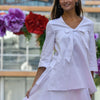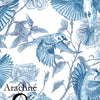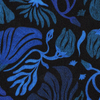Dresses with “Sparrow” Prints: An Arachné Signature
- by Emmanuel Muraille
At Arachné, a pattern is never just a decorative element. It is the heartbeat of each creation—an artistic signature that tells a story, evokes emotion, and conveys a vision. Among the House’s most iconic designs, the “Sparrow” pattern stands out for its timeless elegance and roots deeply anchored in the history of decorative arts.
Inspiration Between Tradition and Modernity
The “Sparrow” motif was born from a clear intention: to echo the world of Toile de Jouy or Delft porcelain, with their indigo blue scenes on white backgrounds. Here, delicate sparrows and fragile roses are painted in watercolor, in a deep and poetic shade of blue. This pattern pays homage to a European visual tradition while embracing a contemporary approach, staying true to Arachné’s identity.
This motif is the result of the first collaboration with artist Mado Berthet.
Lining pattern
Seamless Patterns
After the individual elements are created (see illustration), each one is carefully cut out. The next step is to design a complete composition that can be repeated vertically and horizontally without any immediately visible repetition (see pattern). It’s also worth noting that at Arachné, linings are also printed—with a different motif (see lining pattern).
A Key Piece: The Blue Sparrows Cotton Circular Dress
A symbol of this collection, the Blue Sparrows cotton circular dress perfectly embodies Arachné’s craftsmanship. Its wide and flowing cut highlights the pattern through a refined interplay of volume and movement. Made from 100% cotton and lined with polyester for added structure, it combines comfort, elegance, and originality.
Discover it here : https://arachne.brussels/collections/dress/products/blue-sparrows-cotton-circular-dress
Conclusion
With the “Sparrow” motif, Arachné reaffirms its mission: to create meaningful garments, where art becomes part of everyday life. More than just a dress, it is a wearable artwork, a link between textile heritage and contemporary artistic expression. Each creation becomes a fragment of history—a celebration of nature, craftsmanship, and the beauty of detail.




